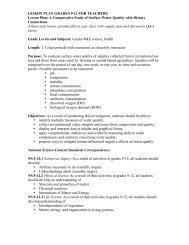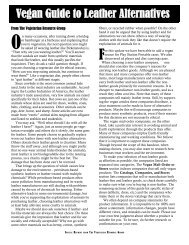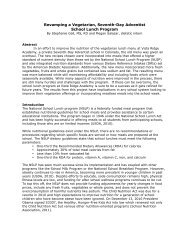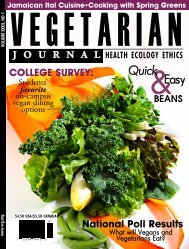Vegan Thickeners - The Vegetarian Resource Group
Vegan Thickeners - The Vegetarian Resource Group
Vegan Thickeners - The Vegetarian Resource Group
You also want an ePaper? Increase the reach of your titles
YUMPU automatically turns print PDFs into web optimized ePapers that Google loves.
the study index were lutein, zeaxanthin, alpha carotene,<br />
beta carotene, beta cryptoxanthin, lycopene, vitamins<br />
C and E, zinc, and selenium.<br />
Julie Rosenthal, MD, who presented results of the<br />
study at <strong>The</strong> Association for Research in Vision in<br />
Ophthalmology (ARVO) Annual Meeting in May 2006,<br />
said, “<strong>The</strong> message that we hope people will take home<br />
is that the study strengthens the evidence that a diet<br />
high in nutrients with antioxidant properties is associated<br />
with a decreased risk of having advanced AMD.”<br />
Another study report, “Dietary Intake of Antioxidants<br />
and Risk of Age-Related Macular Degeneration,”<br />
was published in the Journal of the American Medical<br />
Association (December 28, 2005). In the report, investigators<br />
said that dietary antioxidant intake significantly<br />
reduced the risk of all forms of AMD. More than 4,000<br />
people from Rotterdam, <strong>The</strong> Netherlands, aged 55<br />
years or older, participated in this investigation. A food<br />
frequency questionnaire was used to evaluate study<br />
participants’ intake of a variety of antioxidants. <strong>The</strong><br />
investigators concluded that “an above-median intake<br />
of the combination of vitamins C and E, beta carotene,<br />
and zinc was associated with a 35 percent lower risk<br />
of incident AMD.”<br />
A number of other studies have evaluated antioxidants<br />
and AMD risk, though most have investigated<br />
antioxidant intake through supplementation. Some<br />
have compared blood levels of antioxidants with<br />
retinal health.<br />
A STRESSFUL WORLD FOR THE FRAGILE RETINA<br />
<strong>The</strong> retina is a thin, delicate piece of tissue in the back<br />
of the eye that is comprised of a variety of different<br />
neuronal cells, including 125 million photoreceptors<br />
(rods and cones) that process light and enable you<br />
to see. Experts actually consider the retina to be an<br />
extension of the brain.<br />
For many years, researchers have suspected that<br />
antioxidants might be beneficial to the health of the<br />
retina because it is subjected to so much oxidative and<br />
environmental stress; the retina processes a relatively<br />
large amount of oxygen and waste and is regularly<br />
bombarded by light. Furthermore, the antioxidants<br />
lutein and zeaxanthin are prevalent in the macula and<br />
are what give the center of the eye (behind the pupil)<br />
its dark pigment. <strong>The</strong>ir role is thought to be protective.<br />
<strong>The</strong> benefits of antioxidants in human health are<br />
not definitively understood—they can even be a topic<br />
of controversy. Still, many health experts believe that<br />
antioxidants are important in the diet because they<br />
protect the body’s cells and tissue from the damage<br />
that occurs as a result of normal, daily living and<br />
aging. Antioxidants also appear to protect our bodies<br />
from damage caused by ultraviolet light, X-rays, heat,<br />
cigarette smoke, alcohol, and pollutants.<br />
MORE ON AMD RISK FACTORS<br />
Though dietary antioxidants may reduce your chances<br />
of developing AMD, there are a number of other factors<br />
that affect overall AMD risk.<br />
Recently, researchers found a strong genetic link<br />
to the disease; as many as 74 percent of AMD cases<br />
may have a genetic connection. Genes that control<br />
your immune system and inflammatory responses<br />
appear to be involved. Experts have also known for<br />
many years that AMD runs in families.<br />
Smokers are more likely to develop AMD than<br />
non-smokers. In fact, smoking is the most significant<br />
modifiable risk factor for AMD.<br />
Though the effects of light exposure on the retina<br />
are not completely understood, most retinal experts<br />
agree that you should protect your eyes with sunglasses<br />
when outside in bright light. Use glasses that filter out<br />
both UVA and UVB rays.<br />
Many health experts believe that, in general, an<br />
overall healthy lifestyle can reduce your risk of AMD;<br />
they say that what is good for your heart is also good<br />
for your retina.<br />
SEE YOUR OPHTHALMOLOGIST<br />
Always visit an ophthalmologist if you notice changes<br />
in your vision. However, AMD can occur before noticeable<br />
changes. Only an ophthalmologist can diagnose<br />
the condition by conducting an exam of your retina.<br />
<strong>The</strong> American Academy of Ophthalmology recommends<br />
that people between the ages of 40 and 64 visit<br />
an ophthalmologist every two to four years. People who<br />
are 65 and older should do so every one to two years.<br />
Note: <strong>The</strong> AREDS formulation—an over-the-counter<br />
antioxidant supplement—is often prescribed to individuals<br />
who are at high risk of developing advanced<br />
AMD. <strong>The</strong> amounts of antioxidants in this formulation<br />
are higher than the amounts that can normally<br />
be obtained through diet. If your doctor has prescribed<br />
the AREDS formula for you, do not try to substitute<br />
fruit and vegetable consumption for the formulation.<br />
Always consult your physician if you have questions<br />
about your condition, diet, or supplementation.<br />
Ben A. Shaberman is a writer and a frequent volunteer<br />
for VRG events throughout the Mid-Atlantic.<br />
VEGETARIAN JOURNAL Issue One 2007 11

















